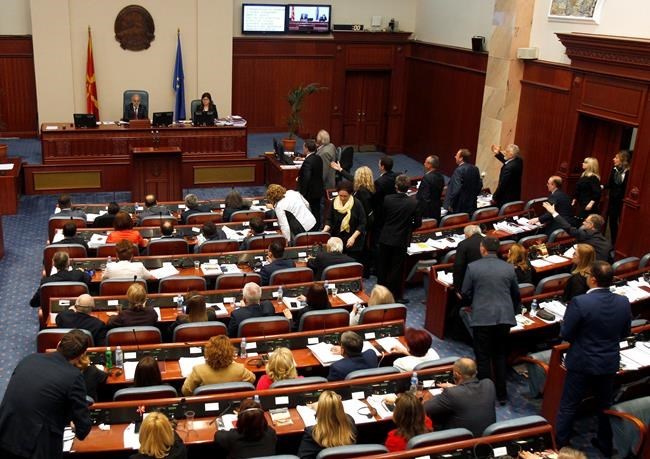
Opposition lawmakers of the VMRO DPMNE party, right, protest during the voting for the law to make Albanian the second official language in the country, on a parliament session in Skopje, Macedonia, Wednesday, March 14, 2018. Macedonian parliament has approved for the second time the law making Albanian the second official language in the country after the country's president Gjorge Ivanov in January has vetoed the bill, describing it as unconstitutional and unnecessary.(AP Photo/Boris Grdanoski)
Republished March 14, 2018 - 2:53 PM
Original Publication Date March 14, 2018 - 10:21 AM
SKOPJE, Macedonia - Macedonia's president refused to sign legislation late Wednesday to make Albanian the country's second official language — an action that could trigger a new political crisis in the small Balkan nation.
Amid protests inside parliament and outside the building, lawmakers approved the bill for second time after President Gjorge Ivanov had refused to ratify it in January.
Under Macedonia's constitution, the president can't veto legislation approved in two separate votes. But Ivanov said in a statement that proper parliamentary procedure hadn't been followed and he refused to sign the bill into law.
"As president of the Republic of Macedonia I will not allow this. The constitution and my conscience do not permit me to sign a decree approving such a law," he wrote in a statement.
"After the violent way in which it was adopted, this law can't be considered an expression of democracy."
The bill was approved by 64 votes in the 120-seat parliament, but the session was repeatedly disrupted by the conservative opposition. Former conservative Prime Minister Nikola Gruevski tried to prevent parliamentary speaker Talat Xhaferi from speaking by switching off his microphone.
His party also tried to delay the vote by tabling 35,000 amendments — which Xhaferi, an ethnic Albanian, ignored.
Macedonia has been plagued by successive political crises by the past three years, fueling intense rivalry between the long-governing conservatives and the Social Democrats who formed a new coalition government last year following months of political turmoil triggered by an inconclusive general election.
Ethnic Albanians make up a quarter of Macedonia's 2.1 million people. Relations with the Slavic-speaking majority have often been tense.
News from © The Associated Press, 2018